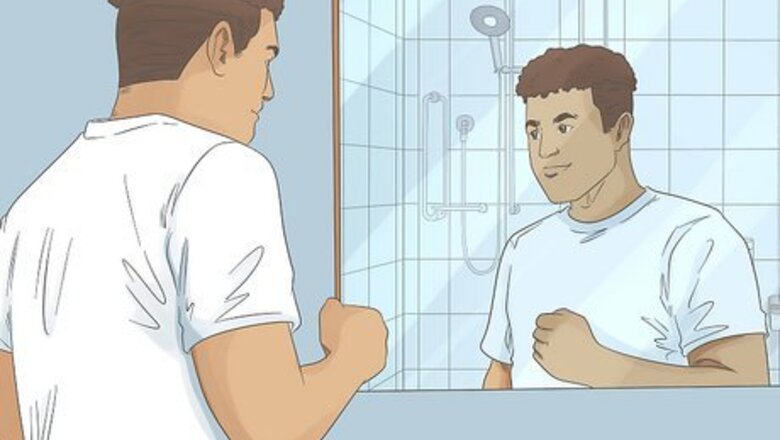
views
Building Self-Confidence
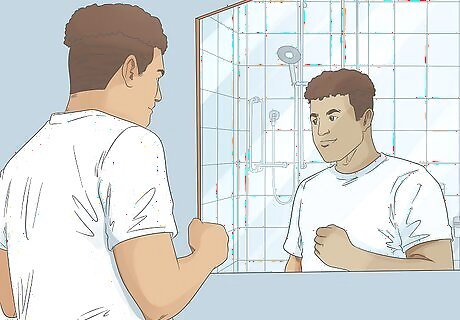
Focus on your strengths. This is the first step to building self-confidence. Since embarrassment is linked to feeling inadequate, reminding yourself of your positive qualities can help you feel less embarrassed in social situations. What are you good at? What are your best attributes? Make a list. Solicit input from your closest friends and family members. Remember to list personality traits, skills and talents, physical features, social or interpersonal skills, and anything else you can think of. Read the list every morning, and add to it! Be kind to yourself, and practice positive self-talk. When you look in the mirror in the morning, smile at yourself and say, "You deserve to be happy today!" You can also pick a physical feature that you love about yourself, and give yourself compliments. Try, "Good morning gorgeous! You have the best smile!"

Figure out your challenges, then set goals. Identify the challenges that might cause you to feel insecure or inadequate. Try to work on these challenges and set measurable, attainable goals to improve in these areas as much as possible. For example, if you are easily embarrassed by small talk because you don't consider yourself to have strong interpersonal skills, you can first work on your interpersonal skills, then set a goal to challenge yourself in that area. Developing interpersonal skills starts by becoming aware of the messages you are sending and then practicing sending different ones. You can team up with a friend (preferably someone with great social skills) and do some role-playing to improve your skills. Be sure to check out Develop Interpersonal Skills to learn more about developing interpersonal skills. Set a small goal to initiate conversation with one peer every week. Gradually you can increase the number of conversations until you are up to one every day. Check out Gain Confidence for more tips on how to develop your self-confidence.
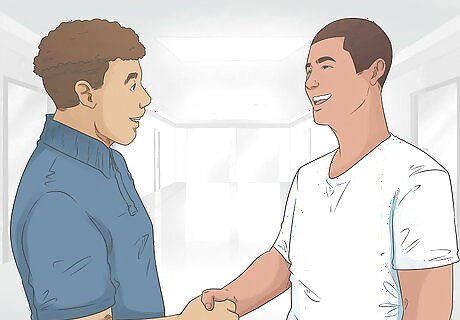
Maintain relationships that build you up. Sometimes a lack of self-confidence can be traced to friends or family members who berate you or put too much focus on superficial things like having the best clothes or the most stylish make-up. Recognize if your close friends and family build you up or tear you down, and don't be afraid to find new friends if yours are causing you pain. Good friends celebrate with you when you succeed and challenge you to try new things. After you spend time with a friend, ask yourself how you feel: Do you feel renewed and refreshed, ready to take on another day? Or do you feel drained and exhausted, as if you've had to put up a front? Your emotional state after spending time with someone can tell you a lot about that person's effect on your self-confidence and general emotional well-being.

Understand that everyone feels embarrassment. Embarrassment occurs most often when we feel that people are looking at us and judging us as inadequate. It can happen suddenly (for instance, if you trip in public) or it can build up (as you prepare a public speech), but it always has its roots in our fear of inadequacy and feelings of insecurity. Simply recognizing that everyone experiences embarrassment is one of the most important steps in helping you to overcome it yourself. Most people struggle with feelings of inadequacy throughout their lives, and embarrassment in social situations is a very common way it manifests. Try looking at celebrities with new eyes: Jim Carey, Kim Cattrall, and William Shatner have all struggled with crippling stage fright that almost derailed their careers. But all of them have gone on to hugely successful careers. Feelings of inadequacy are often traced all the way back to childhood. For example, if you felt you had to fight for your parent's approval or attention, if what you did was never good enough to get their attention, or if you were bullied by your peers, you might struggle with feelings of inadequacy even as an adult. In some cases, you might benefit from therapy to deal with childhood issues that contribute to your feelings of embarrassment today.
Handling Embarrassment
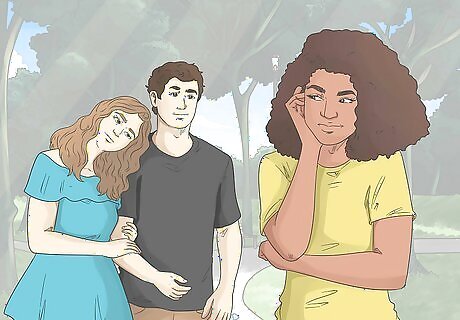
Recognize your embarrassment triggers. What types of situations are most embarrassing for you? Are you most embarrassed when you feel strangers are judging you, such as when you have to give a speech to a large audience? Or do you feel most embarrassed when those close to you see you do something awkward, like when food is stuck in your teeth or toilet paper on your feet? Some people tend to experience the most embarrassment when people they know see them do something wrong. This feeling is closely related to shame. Other triggers include other people saying or doing things that seem inappropriate (such as talking about sex or bodily functions around you). Other times, embarrassment comes from general feelings of inadequacy. This might manifest as a fear of meeting new people, embarrassment about your appearance, or fear to speak up in class.

Recognize that it's OK to be embarrassed. Every person experiences embarrassment; it's part of being human! Just like making mistakes and learning from them, embarrassing situations can teach you a lot about who you are as a person and what you value. It can also teach you about areas where you want to grow as a person. Being easily embarrassed is a personality trait, part of what makes you who you are. People who are easily embarrassed also tend to feel other emotions deeply, making them great empathizers and great friends. Be proud of who you are! Ask your friends about embarrassing things that have happened to them. This will reassure you that everyone goes through embarrassing moments!

Forget past mistakes. It is easy to dwell on embarrassing things that have happened to you and imagine that other people think of those things when they see you. The truth is, most people have enough of their own insecurities to think about without worrying about your issues! Occasionally, it's OK to relive past embarrassment, if only to put current embarrassing situations in perspective. After all, you lived through every past embarrassing thing you've ever done, so why should this one be any different? Otherwise, be kind to yourself and allow yourself to forget and move on. What would you say to a good friend who was in your shoes? Remember to be a friend to yourself.
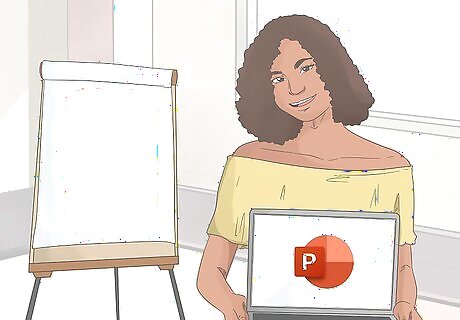
Avoid situations that you know will be embarrassing. Sometimes, recognizing the type of embarrassment you are most prone to can help you avoid situations where you are likely to encounter your trigger. If you must give a speech and public speaking is your trigger, try using a Powerpoint slideshow or other visual aid. This helps by subtly distracting people from staring at you as you talk. Also, practice until you are perfectly familiar with all of your material; this will make you more confident that you know your stuff.

Ask your friends for support. If you trust your family and friends to not take advantage of your insecurities by purposely embarrassing you, you can enlist them to help you avoid embarrassing situations. Let your friends know what issues are most embarrassing for you and ask them to help you avoid them. If your friends tend to point out that your face is turning red, ask them to stop. Studies show that simply telling someone that their face is red will make their face turn redder! Ask people you trust to stop teasing you about sensitive topics. For some people, the most embarrassing thing is when they are teased about an insecurity (like a physical attribute or someone they have a crush on). If someone really cares about you and learns that this issue bothers you, they will stop teasing you. If they don't stop, it might be time to find new friends.
Coping Strategies

Control your physiological responses. The body registers embarrassment as fear, and initiates a fear response consisting of symptoms like a racing heart beat, sweaty palms, blushing cheeks, and a stammering voice. With practice, you can learn to control these physiological responses by focusing your attention and calming your mind, using techniques similar to those used to calm panic attacks. Focus your attention on something in the room that is non-threatening, like a clock, poster, or even a crack on the wall. Think about the details of that thing, and then begin practicing deep breathing techniques. Breathe slowly and deeply, counting to three during each inhale and exhale. Focus on the feelings of the air filling up your chest and leaving your body. Imagine stress and anxiety leaving in your breath. If the embarrassing situation is something planned (such as a speech or meeting your significant other's parents), try to do something relaxing right before it begins. Many stage performers have pre-show rituals that help them to focus and get rid of last minute stage fright. Brian Wilson of the Beach Boys, for example, gets a massage and says a prayer before every show.
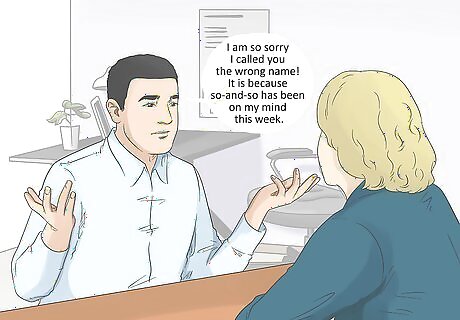
Acknowledge the embarrassment. If you do something unexpected and embarrassing, such as spilling your drink on the conference room table or calling your boss by the wrong name, acknowledging the situation helps lighten the mood. Try explaining why the situation happened. For instance, say "I am so sorry I called you the wrong name! It is because so-and-so has been on my mind this week." You can also try asking for help. If you spill something or trip on the ground, ask an onlooker to help you out. Instead of laughing at your mistake, they become invested in a solution to the problem.

Laugh along. If you do something embarrassing during a meeting or in class, odds are good that someone in the room will giggle. Laughing at awkward situations is a natural human response, and doesn't mean that the person thinks less of you. Laughing along shows that you have a good sense of humor and don't take yourself too seriously. Studies show that using humor to offset embarrassing situations is the most effective solution, so learn to laugh at yourself. You can make a joke if you're quick on your feet (for example, if you spill coffee on a report during a meeting, you might say, "I hope there wasn't anything important in there!"), but if not, just smile and say, "Well, that was awkward!"
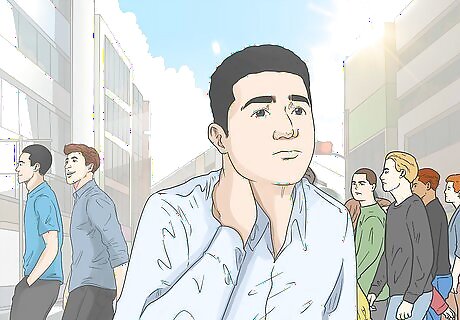
Recognize if it's more than embarrassment. Sometimes the tendency to become embarrassed can be a trait of a perfectionist personality. But more rarely, overwhelming feelings of embarrassment can signal a social anxiety disorder. If your fear of becoming embarrassed or being judged by others interferes with day to day activities or makes it hard for you to enjoy social life, you might have a disorder called social phobia (sometimes known as social anxiety disorder). While most people experience embarrassment if they have to give a public speech or if they trip in front of a crowd, people with social phobia might be embarrassed by simple everyday things like ordering at a restaurant or eating in public. Symptoms of social phobia usually emerge around puberty. There are several treatment options for people suffering from social phobia, including psychotherapy or medication. Talk to your doctor to get a referral to a therapist or psychologist.




















Comments
0 comment